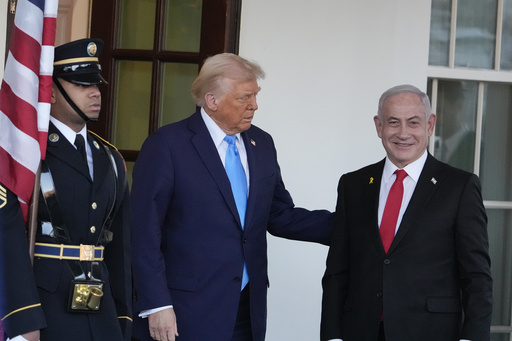
WASHINGTON — On Tuesday, President Trump commented on the ongoing situation in Gaza, asserting that “the Gaza thing has never worked.” This remark, made during a meeting with Israeli Prime Minister Benjamin Netanyahu at the White House, reflected his administration’s skepticism regarding a proposed three-to-five-year timeframe for reconstruction in a war-impacted area, as suggested in a temporary ceasefire agreement.
Trump reiterated his belief that Arab countries should assist in relocating the displaced Palestinian population, stating emphatically, “you can’t live in Gaza right now, you need another location.” He elaborated, expressing that if suitable land could be found, it would be far more beneficial for displaced Palestinians to live in well-developed accommodations than to return to Gaza. However, this idea has faced strong opposition from both Egypt and Jordan, with these nations, alongside others, outright rejecting the relocation plan.
Despite the resistance, high-ranking administration representatives continue to advocate for the relocation of Palestinians, framing it as a humanitarian necessity. Steve Witkoff, the Middle East envoy, declared that it is unreasonable to suggest to Palestinians that they might be able to return to Gaza in five years, terming that notion “preposterous.”
The discussions surrounding reconstruction are taking place amid a tenuous ceasefire between Israel and Hamas, with Prime Minister Netanyahu navigating contradictory pressures. On one hand, he faces demands from his right-wing coalition to terminate the ceasefire, while on the other hand, public sentiment in Israel is increasingly weary of the prolonged conflict, particularly as hostages from the fighting remain unreturned.
In light of these circumstances, Trump holds a cautious stance regarding the possibilities of sustaining peace, even as he claims responsibility for facilitating the ceasefire and hostage agreements that took effect shortly after he assumed office again last month. He stressed, “I have no guarantees that the peace is going to hold.”
During the talks between Trump and Netanyahu, crucial topics such as the long-anticipated normalization agreement between Israel and Saudi Arabia, as well as the Iran nuclear dilemma, are anticipated to be discussed. Nevertheless, finalizing a new phase of the hostage negotiation will be the primary focus.
Since returning to power, Trump has advocated moving Palestinians from Gaza to neighboring nations like Egypt and Jordan, despite the outright rebuttal from leaders of those countries, including Egyptian President Abdel Fattah el-Sissi and Jordan’s King Abdullah II. Notably, several Arab nations—including Saudi Arabia and the Arab League—echo similar rejections of the proposed relocation.
Trump claims that he can sway the neighboring countries to reconsider their position on the displaced populations, citing significant U.S. financial aid as leverage. Certain right-wing factions within Netanyahu’s government have also embraced the idea of relocating Palestinians.
Netanyahu’s visit marks a significant first international engagement during Trump’s second term, as public support for the Prime Minister diminishes due to an ongoing corruption trial. He has frequently described the allegations against him as part of a “witch hunt.” By associating with Trump, who enjoys popularity in Israel, Netanyahu may hope to shift public attention away from the trial.
It’s noteworthy that Netanyahu’s travel to Washington occurs against the backdrop of arrest warrants issued by the International Criminal Court concerning potential crimes against humanity during the Gaza conflict, although the U.S. does not acknowledge the ICC’s authority.
In a recent meeting with national security adviser Mike Waltz and Witkoff, Netanyahu characterized the discussions as “positive and friendly,” confirming the continuation of indirect negotiations with Hamas, which are mediated through Qatar. He also intends to convene his security cabinet upon his return to Israel to discuss plans regarding the next phase of the ceasefire. Meanwhile, Witkoff has scheduled a meeting with Qatar’s Prime Minister to further address the ceasefire process.
Netanyahu faces mounting pressure from hardline elements within his coalition, who insist on resuming hostilities to dismantle Hamas. If these factions feel ignored, significant political repercussions, including calls for resignation or elections, could ensue.
Hamas has declared it will not consider releasing hostages without assurances of an end to hostilities and a complete withdrawal of Israeli forces. Netanyahu maintains that reinvigorating the confrontation remains Israel’s priority alongside securing the return of all hostages related to the conflict.
A family member of a hostage recently urged Trump to leverage U.S. influence to ensure Netanyahu adheres to the ceasefire agreement, emphasizing the need for caution against far-right influences that they believe threaten the region’s stability.
Additionally, Netanyahu’s agenda during this visit is expected to include pressing Trump for significant action concerning Iran, which faces various setbacks in the military scope, notably the reduced capacities of groups such as Hamas and Hezbollah. The Prime Minister believes that these circumstances present a timely opportunity to tackle Tehran’s nuclear ambitions.
In advance of his critical meeting with Netanyahu, Trump has issued an executive order aimed at amplifying economic pressure on Iran as part of ongoing geopolitical strategies.

